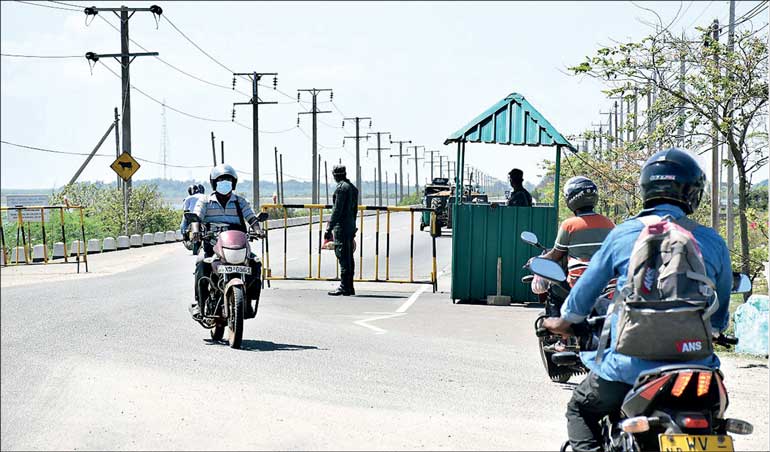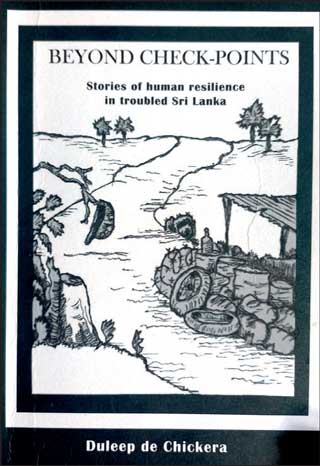Sunday Feb 22, 2026
Sunday Feb 22, 2026
Monday, 25 March 2024 00:06 - - {{hitsCtrl.values.hits}}

Beaten, broken and bruised: but carrying on with courage and compassion ‘beyond checkpoints’
 In a nation notorious for not remembering many matters of importance beyond the news cycle, remembering right becomes a sacred trust and duty. Sri Lanka has faced many challenges as a country and a people in its chequered history since independence, and forgetfulness must not be added to its woes.
In a nation notorious for not remembering many matters of importance beyond the news cycle, remembering right becomes a sacred trust and duty. Sri Lanka has faced many challenges as a country and a people in its chequered history since independence, and forgetfulness must not be added to its woes.
Thus a poignant memoir of episodes still not out of mind comes as a welcome reminder that once upon a time in our erstwhile island paradise, there was ‘something rotten in the state’. It was not a people, political party or government, or even a separatist movement that escalated into terrorism, which were solely to blame for the phenomenon we ironically recall as a ‘civil war’.
Shall we suggest there was little if anything civil about it? Perhaps the bruises of memory are soothed by the balm of forgetfulness. However – and lest we are condemned to repeat the lessons of a painful past we have yet to learn and benefit from as an island race – there is great merit in permitting a meaningful percolation.
‘Beyond Checkpoints: Stories of human resilience in troubled Sri Lanka’ is precisely such a brew. While not a panacea, ‘strong emotions recollected in tranquility’ offers a soothing potion of sorts if it is imbibed in the right spirit and measure.
This slim (yet, in other ways substantial) volume of personal experiences encapsulates the traumas of a nation and her children in a sensitive and significant volume of recollections.
Start with an end
Bishop Emeritus Duleep de Chickera begins with a confession – that this book “has not been researched”. Instead it is based on “observations, encounters and experiences” which he says “taught us hard and lasting lessons”. Together with his wife Geetha, the former overseer of the Anglican Diocese of Colombo considers it to have been their “sacred privilege to befriend a cross-section of people directly caught up in the conflict”.
A shepherd’s ethos shines through the Preface to the book in which the writer affirms its rationale:
“As these interactions slowly transformed our understanding of human nature, we gained fresh insights into human resilience and more. The way most persons coped with and how some even matured in stature through these harsh realities was overwhelming, and had to be recorded.”
In this enterprise, the author’s methodology was “to allow memory to trigger memory, and narration to do its bit” when “the space to write widened”.
Therefore, the genre of this tome “is neither a history nor a novel, even though real happenings and story-telling feature in it”; and in addition, “its contents suggest it could be best described as the public disclosure of an informal, personal journey, mostly recorded in the mind”.
Despite the informal oeuvre of a shepherd’s walk with a larger flock than mandated ex officio, there is a certain poignancy in the author’s articulation of a people’s distress whereby “the faces, the places, the words and the silence, the moods and the wounds, the gestures and the signs, the risks and the sacrifices, the fears and aspirations, explanations and protests; all connect, to compel a more permanent form”.
That form is a book, which according to Foreword writer Prof. Gameela Samarasinghe, “is a testimony of Bishop Duleep’s connection to people, male and female, of all ages and ethnic groups, during the war that ravaged Sri Lanka for more than 30 years”. The Clinical Psychologist and Faculty Member at the University of Colombo adds, “in some ways, my work is similar to his, as it also examines narratives of people, though through a therapeutic lens with the objective of alleviating psychosocial suffering,” thereby framing the work’s raison d’etre.
It is a work that embraces the deepest human feelings, emotions and instincts manifested in times of conflict and war: loss, suffering, courage, survival, resistance, kindness and compassion.
The narratives also serve to encapsulate the harsh realities to which multiple generations of islanders were subject over three decades – and demonstrably more, in a milieu where we have failed to beat our swords into ploughshares, by transforming ourselves from a postwar state into a postconflict society more appetised by the fruits of peace with justice.
These realities span the gamut of authoritarian regimes; conscription by ruthless terrorist organisations; the rule of law in its awesome presence and use, as well as awful absence or abuse; the ethnic violence of July 1983 that still scars so many Sri Lankans even today and arguably always; power dynamics at checkpoints in a war-torn country; “how war divides people and how it ‘becomes a convenient method of resolving differences’”; and discrimination, disappearances and conscription.
The middle of silence amidst a melee of sounds
The work is at its richest in reflective vein. These insights take many and varied forms. That the narrator of the overarching work is often silent – in fact, mostly so, eschewing editorial commentary in order that his characters may speak more directly to the reader – is a technique usefully and skilfully deployed.
For instance, one conversation around a breakfast table in the north – bereft of utilities as much as useful answers – reflects the burning issues that bothered a people inflamed by the human condition stretched to its utmost limits: “What was really wrong with us as a people? Why were we not civic-minded enough to bring change, and why were we allowing discrimination and violence to take the upper hand? Why was there no public protest against war, and why was there no North-South people’s movement to bring us to our senses?”
This, in an epoch of extreme rationing and dangerously low reserves of everything – from energy to enthusiasm – in the North, ironically foreshadowing a similar era that was to be the South’s fate, including the emergence of a people’s movement fuelled by the notion of popular sovereignty…
Other conversations point to the predicament of people under oppressive regimes. As one champion of the people in the face of state and separatist tyranny muses: “We have to learn to handle power without losing our social consciousness. This is our best chance to become a developed and just society. Take, for instance, the ones in parliament. No sooner they get in there, they become different people. They forget their mandate is from the people, for the people, and become immersed in self-interest. The strings of power become like a toy. The ability to make things happen with just a word can be intoxicating.”
Years, decades, after the war, has anything changed? Is there, in fact, a war for justice still going on amidst an alien people clutching their demigods of failed democracy and fanatic demagoguery alike?
In all of this, the author does not take sides. In truth, he uses the editorial voice amidst compelling and often chilling narration to make this sense of balance and perspective abundantly clear:
“Careless words easily provoked ‘The Other Side’ syndrome, and pressed buttons marked ‘Suspicion’. … ‘the other side’ geographically means ‘the other side’ ideologically. Land and people simultaneously became [the] enemy in times of war. It did not matter if most on ‘the other side’ did not want this war or that all sides belonged to one national family.”
Speaking truth to power – be it state tyrant or separatist terrorist or the usual suspects whom victims of war often caricaturize to make sense of meaninglessness in times of stress and conflict – the author holds out hope based on his encounters with survivors:
 |
| Beyond Checkpoints: Stories of human resilience in troubled Sri Lanka by Bishop Emeritus Duleep de Chickera (Published by the Diocese of Colombo, October 2023) |
“There was a way to survive under oppressive conditions. This was to nurture one’s inner sense of freedom within that private unseen terrain that neither tyrant nor informant could see or invade. It was within this crevice of privacy that people of conscience had, through history, defied attempts to steel their freedom.”
This small triumph of the human spirit flickers like a candle in the wind of human endeavour on behalf of their stricken fellows in the microcosm of conflict that is the universe of this book. In which there is little else to hold on to when “all the UN’s motions and all the parliaments of the world brought little relief when tyranny strode down lonely byways in the darkness of night.”
School of thought
Yet, the personal becomes the pointedly anecdotal as this former Sub-Warden of S. Thomas’ College Mount Lavinia reveals his experience of a pogrom during his tenure at the ‘School by the Sea’. It was, in the words of another chronicler, “the best of times, the worst of times”.
The worst was made evilly manifest in the grim reality that “Tamils were being attacked indiscriminately”, “Tamils were attacked for being Tamil”, “a more sinister explanation began to unfold”, “rampaging mobs had lists of Tamil homes and businesses”, “the violence was orchestrated”, “the confirmation was chilling”, and “when he finally addressed the country, five days into the havoc, the then President implied the Tamils deserved it”.
But there was a best to better this blatantly racist business. The school became a shelter; the scared and confused were comforted and encouraged; the frightened were fed; where “sleep was a luxury” when and where “there was something ominous in the air”, “the response was spontaneous” and while “all that the College stood for, over the decades, was being put to the test”, the staff, stewards, and stalwarts of S. Thomas’ safeguarded those within and without their precincts who sought refuge in the environs of the school.
And although it was a shining hour for Sri Lankan solidarity in the face of an insidious evil that has never been fully explained, forgiven or forgotten, it is regrettable that “all that remained were brittle memories that, with time, would escape the attention of the historian”.
From boys to men, there are plenty of tear-jerkers in store for the sensitive reader. One of the most poignant chapters is about the funerals of former students who donned one uniform or another in the service of the state or defence of the motherland. When the senior cleric called over to pay his respects, “I had no word for their families.” And this was later to match the dictum observed by the clergy-led teams that visited the theatres of war: “Kill the empty words.”
This poignant insight cannot fail to move more than bereft mothers or grieving widows: “To remember the dead as they lived is a small consolation in times of grief. It creates a healing ramp that slowly acknowledges the inevitable. Memory of life together is just a step away from life together.”
The living are paid their due respect too. Writes their erstwhile mentor: “In a highly politicized civil conflict, tensions between command and conscience were to be expected. ‘Things are becoming difficult,’ was all they would say. … The conflict was not about going to the front. They had the courage for that. This was about happenings that their work ethic refused to accommodate. The lessons of loyalty and sportsmanship learned on the ‘small club’ and ‘big club’ [the ‘playing fields of S. Thomas’] prevented them from staying on or saying more…”
More than is dreamt of in philosophy
The book subtly captures a plethora of issues, events and happenings through the eyes and words of people.
Apparently aware of the author’s interest in reconciliation, his driver – who faithfully chauffeured him ‘beyond checkpoints’ – is reported as discoursing on “the potential in face-to-face community gatherings to heal misunderstandings”.
The writer comments: “His simple reasoning made a profound case for public scrutiny at peace negotiations. Knowing they are being watched by their constituencies would have potential to reduce dilly-dallying and improve the performance of the parties at the table.”
The same character “often lamented that not enough Sinhalese people knew Tamil” and “listened intently” when his episcopal charge “spelt out the ill-begotten Sinhala Only Act”.
And the former “soon came to believe that all Sri Lankans should be conversant in each other’s languages” and was amused by the bishop’s suggestion that “we needed to know at least two and a half languages, to cement relationships and hold the country together”.
But “the Sinhala [sic] mindset was changing slowly. After the war, a former classmate of [the driver’s], in uniform, talked of ‘the elderly Hindu man who would weep at the site of his property taken over for a Buddhist shrine.’ Under the stern image of the military uniform, the conscience of these rural soldiers was being stirred. Their worldview had space for fair play beyond populist provocation.”
The author observes that “the narration of these experiences and stories in the villages became counter-messages to the lies and propaganda that sections of the media churned out”, affirming that “the living witness next door is more powerful than the aggregated mass of media manipulation.”
A Buddhist-monk friend of the author agrees: “It is war propaganda more than the actual war that divides the people … the clever use of words and symbols that suggest the other side is in the war for evil reasons while we are in it for noble reasons.” A senior journalist cited in the book concurs: “The task of war propaganda is to change the ugly face of war and make it seem like an exciting game.”
Not only media and state actors but separatists and terrorist movements also get short shrift, albeit through the utterances of people who had been inveigled to settle in the north to provide a buffer zone for the LTTE. As one such notes: “The Tigers were master manipulators. They brandished a gun and imposed a street psychology, beginning with those they claimed to protect.”
The author in situ muses: “The first casualty in war is not truth. … This saying surely came from a comfortable neoliberal capitalist. It is the poor [who are the first casualties]. The need for survival slings a gun on the shoulders of those who search for bread. This is a born again fact of history. The poor are always excluded from the right to dignity.”
And the interestingly named Kadir – a science graduate from Colombo University then resident in Kilinochchi – agrees: “Patriotism, nationalism, separatism mean nothing to the poor who point their guns at each other. … Causes beyond this are manipulated in plush places in Colombo, Canada and Canberra.”
End with a start
They say there are no heroes in war, only victims or survivors. However, even though it does not explicitly say so, this work may beg to differ. By offering up for thoughtful public consumption the private slices of life that redound to personal courage and heroism in the face of dire circumstances and daunting challenges, the book dresses wounds in the body politic.
And by addressing issues faced by as well as misconceptions about desperate people caught up in a conflict not of their making, it redresses the balance between arrogant resolutions and resilient attitudes.
As a Reverend Sister who worked among vulnerable women in the South asserts: “This inner resilience creates an unbelievably strong network of resistance among persons of conscience.”
It teaches people to “acknowledge and support one another”, affirms a journalist of the bishop’s acquaintance, adding: “Together, we look for some fresh air in a highly polluted political prison.”
These prisoners of conscience, and captives of hope and human resilience, amidst the vagaries of life in general and the vicissitudes of war in particular, comprise a formidable ensemble in a book about making meaningful survival a salutary alternative to capitulating to evil or apathy when senseless conflict rules the order of the day and times.
The author dedicates his work to his grandchildren, as well as the children of their generation, with the observation that “some books make us strong by first making us sad” and the wish “I hope this book will deepen your sensitivities and add strength to your lives”.
That is a hope and a wish fit for dedication to their parents and grandparents too.
Trust that the personal experiences offered – not as a prescription but a description (and a diagnosis or prognosis) of what once ailed us as a people – will safeguard all our generations from a similar destiny, which could come to pass again if we don’t remember rightly our traumatic inherited past…
As now, so then: “The task ahead [is/was] to comfort the broken-hearted, hear unending cries for justice and peace, and dig out the remains of hope that lay buried in the debris…” of war, the Wanni and a wounded nation.
| Editor-at-large of LMD | Sri Lankan still ruing the tragic realities of a once war-torn still hurting nation state |